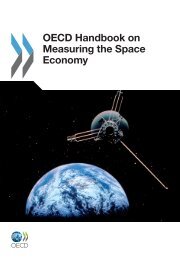Evaluating Country Programmes - OECD Online Bookshop
Evaluating Country Programmes - OECD Online Bookshop
Evaluating Country Programmes - OECD Online Bookshop
You also want an ePaper? Increase the reach of your titles
YUMPU automatically turns print PDFs into web optimized ePapers that Google loves.
<strong>OECD</strong> 1999<br />
<strong>Country</strong> Assistance Strategies as a Management and Evaluation Instrument for Donors<br />
areas selected. It is this rationale that transforms an assortment of individual<br />
projects into a coherent programme. Hence, the questions raised in Box 8.3<br />
with regard to the rationale of the country programme can only be answered<br />
with reference to the underlying country concept. <strong>Evaluating</strong> the rationale of<br />
the country programme means evaluating the appropriateness of the country<br />
concept, which itself depends on three basic factors:<br />
Relevance of the priority areas identified in the country concept: The criteria<br />
of relevance are those mentioned in the section “criteria for the identification<br />
and selection of priority areas” (reference to the core problems<br />
and development potentials of the partner country, etc.). If it turns out that<br />
the country concept has identified irrelevant priority areas on which German<br />
development co-operation with the partner country was subsequently<br />
concentrated, the whole undertaking (the country programme)<br />
does not make much sense. Hence any evaluation of a country programme<br />
of German development co-operation has to start with the question: Has<br />
the BMZ’s country concept identified relevant priority areas?<br />
Relevance of the objectives formulated for the contribution to be made by<br />
German development co-operation in priority areas: These objectives<br />
must be stated in the country concepts or the priority area strategy papers.<br />
According to the BMZ guidelines for preparing country concepts, the criterion<br />
of relevance is the development impact of Germany’s engagement in<br />
the priority areas, i.e. a structure-building effect, a contribution to create<br />
conditions conducive to development.<br />
Chances of the objectives being realised: They depend on both the<br />
design of the country programme (i.e. the selection and interplay of individual<br />
projects in a priority area) and the framework conditions in the<br />
partner country. The country concepts (or the priority area strategy<br />
papers) are supposed to provide information on these issues. The evaluation<br />
has to analyse whether the chances of the objectives being<br />
achieved were properly assessed in the country concept (or the priority<br />
area strategy papers).<br />
– Objectives achievement (effectiveness) of the country programme: At the project level,<br />
there is a clear difference between the goal achievement (effectiveness) and<br />
the impact of an undertaking. The term “goal achievement” refers to the<br />
question: To what extent have the goals of a project (in terms of the measurable<br />
output) been achieved, whereas the impact of a project consists of its<br />
effects on the (economic, social, political, environmental) development process.<br />
At the level of a country programme, however, the criteria of goal<br />
achievement and intended development impact coincide by definition<br />
since the BMZ guidelines for the country concepts call for defining the goals<br />
203

















![CQE=U]^\]Z: KAZAKHSTAN - OECD Online Bookshop](https://img.yumpu.com/3915768/1/190x253/cqeuz-kazakhstan-oecd-online-bookshop.jpg?quality=85)